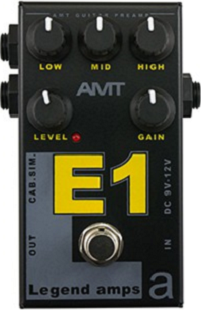Difference between revisions of "E1"
(→Jacks) |
|||
| Line 15: | Line 15: | ||
===Jacks=== | ===Jacks=== | ||
| − | + | It's not always immediately obvious why multiple jacks are available. We hope this helps provide some clarity. Avoiding mistakes tends to help avoid bad tone... | |
* Jack 1 - '''"Input"''': Input | * Jack 1 - '''"Input"''': Input | ||
* Jack 2 - '''"Cab Sim Out"''': This output is full line-level from the preamp and also offers speaker cabinet tone shaping. This output jack can be plugged directly into a mixing console, the input of a power amp, or the return jack of an effects loop of a standard guitar/bass amplifier. | * Jack 2 - '''"Cab Sim Out"''': This output is full line-level from the preamp and also offers speaker cabinet tone shaping. This output jack can be plugged directly into a mixing console, the input of a power amp, or the return jack of an effects loop of a standard guitar/bass amplifier. | ||
* Jack 3 - '''"Output"''': This output is an instrument-level out and this output is attenuated from the line-level that the preamp that is this pedal creates so that further pedal or amplifier tone-shaping can take place. | * Jack 3 - '''"Output"''': This output is an instrument-level out and this output is attenuated from the line-level that the preamp that is this pedal creates so that further pedal or amplifier tone-shaping can take place. | ||
| − | |||
==Bypass: True== | ==Bypass: True== | ||
Revision as of 02:56, 11 September 2018
AMT Electronics E1 Engl emulator preamp. This pedal is not only an emulator of the lead channel from the Engl Fireball, it is also a preamp in its own right and must be handled like a preamp so you can avoid using it incorrectly. The most important means of doing so is noticing that there are two output jacks: one for instrument-level output, and another for line-level output.
Controls

- Knob 1 - "Low": This knob controls the amount of low-, or bass frequencies in the signal. Turning the knob clockwise increases these frequencies.
- Knob 2 - "Mid": This knob controls the amount of midrange frequencies in the signal. Turning the knob clockwise increases these frequencies.
- Knob 3 - "High": This knob controls the amount of high-, or treble frequencies in the signal. Turning the knob clockwise increases these frequencies.
- Knob 4 - "Level": This knob controls the total amount of signal volume coming from the pedal. Clockwise is louder.
- Knob 5 - "Gain": This knob controls the total signal going into the pedal for creating gain and therefore distortion. Clockwise is more distortion.
- Footswitch 1 - "On/Off": This button-switch toggles the pedal on and off.
Jacks
It's not always immediately obvious why multiple jacks are available. We hope this helps provide some clarity. Avoiding mistakes tends to help avoid bad tone...
- Jack 1 - "Input": Input
- Jack 2 - "Cab Sim Out": This output is full line-level from the preamp and also offers speaker cabinet tone shaping. This output jack can be plugged directly into a mixing console, the input of a power amp, or the return jack of an effects loop of a standard guitar/bass amplifier.
- Jack 3 - "Output": This output is an instrument-level out and this output is attenuated from the line-level that the preamp that is this pedal creates so that further pedal or amplifier tone-shaping can take place.
Bypass: True
The E1 is a true bypass pedal.
General Information
The "Cab Sim Out" is the output jack closest to the top edge of the pedal. The standard instrument-level output is matched by the instrument input on the other side of the pedal.
Pedal Manual
Phase Inversion: Unknown
The phase-inversion properties of the E1 pedal are currently unknown.
Schematic
I'm amazed that we found this!
And then there's another one: version 2(?)
Artists
We are currently unaware of any artists actively using the pedal now, or who have in the past.
- Additional Sources